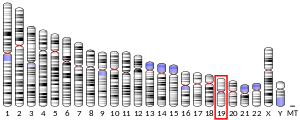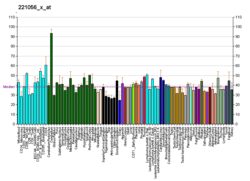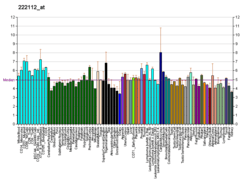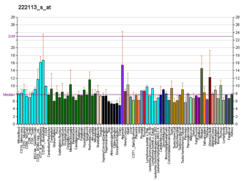EPS15L1
Epidermal growth factor receptor substrate 15-like 1 is a protein that in humans is encoded by the EPS15L1 gene.[5]
Interactions
EPS15L1 has been shown to interact with HRB.[6]
gollark: This is for purposes.
gollark: Start knowing.
gollark: WRONG.
gollark: This may be hard as I do not know why it is down.
gollark: I need to bring the server cuboid up first.
References
- GRCh38: Ensembl release 89: ENSG00000127527 - Ensembl, May 2017
- GRCm38: Ensembl release 89: ENSMUSG00000006276 - Ensembl, May 2017
- "Human PubMed Reference:". National Center for Biotechnology Information, U.S. National Library of Medicine.
- "Mouse PubMed Reference:". National Center for Biotechnology Information, U.S. National Library of Medicine.
- "Entrez Gene: EPS15L1 epidermal growth factor receptor pathway substrate 15-like 1".
- Doria M, Salcini AE, Colombo E, Parslow TG, Pelicci PG, Di Fiore PP (Dec 1999). "The eps15 homology (EH) domain-based interaction between eps15 and hrb connects the molecular machinery of endocytosis to that of nucleocytosolic transport". J. Cell Biol. 147 (7): 1379–84. doi:10.1083/jcb.147.7.1379. PMC 2174238. PMID 10613896.
Further reading
- Salcini AE, Confalonieri S, Doria M, Santolini E, Tassi E, Minenkova O, Cesareni G, Pelicci PG, Di Fiore PP (1997). "Binding specificity and in vivo targets of the EH domain, a novel protein-protein interaction module". Genes Dev. 11 (17): 2239–49. doi:10.1101/gad.11.17.2239. PMC 275390. PMID 9303539.
- Carbone R, Fré S, Iannolo G, Belleudi F, Mancini P, Pelicci PG, Torrisi MR, Di Fiore PP (1997). "eps15 and eps15R are essential components of the endocytic pathway". Cancer Res. 57 (24): 5498–504. PMID 9407958.
- Coda L, Salcini AE, Confalonieri S, Pelicci G, Sorkina T, Sorkin A, Pelicci PG, Di Fiore PP (1998). "Eps15R is a tyrosine kinase substrate with characteristics of a docking protein possibly involved in coated pits-mediated internalization". J. Biol. Chem. 273 (5): 3003–12. doi:10.1074/jbc.273.5.3003. PMID 9446614.
- Chen H, Fre S, Slepnev VI, Capua MR, Takei K, Butler MH, Di Fiore PP, De Camilli P (1998). "Epsin is an EH-domain-binding protein implicated in clathrin-mediated endocytosis". Nature. 394 (6695): 793–7. doi:10.1038/29555. PMID 9723620.
- Ueki N, Oda T, Kondo M, Yano K, Noguchi T, Muramatsu M (1998). "Selection system for genes encoding nuclear-targeted proteins". Nat. Biotechnol. 16 (13): 1338–42. doi:10.1038/4315. PMID 9853615.
- Doria M, Salcini AE, Colombo E, Parslow TG, Pelicci PG, Di Fiore PP (1999). "The eps15 homology (EH) domain-based interaction between eps15 and hrb connects the molecular machinery of endocytosis to that of nucleocytosolic transport". J. Cell Biol. 147 (7): 1379–84. doi:10.1083/jcb.147.7.1379. PMC 2174238. PMID 10613896.
- Offenhäuser N, Santolini E, Simeone A, Di Fiore PP (2000). "Differential patterns of expression of Eps15 and Eps15R during mouse embryogenesis". Mech. Dev. 95 (1–2): 309–12. doi:10.1016/S0925-4773(00)00363-4. PMID 10906484.
- Martina JA, Bonangelino CJ, Aguilar RC, Bonifacino JS (2001). "Stonin 2: an adaptor-like protein that interacts with components of the endocytic machinery". J. Cell Biol. 153 (5): 1111–20. doi:10.1083/jcb.153.5.1111. PMC 2174325. PMID 11381094.
- Poupon V, Polo S, Vecchi M, Martin G, Dautry-Varsat A, Cerf-Bensussan N, Di Fiore PP, Benmerah A (2002). "Differential nucleocytoplasmic trafficking between the related endocytic proteins Eps15 and Eps15R". J. Biol. Chem. 277 (11): 8941–8. doi:10.1074/jbc.M108385200. PMID 11777906.
- Brill LM, Salomon AR, Ficarro SB, Mukherji M, Stettler-Gill M, Peters EC (2004). "Robust phosphoproteomic profiling of tyrosine phosphorylation sites from human T cells using immobilized metal affinity chromatography and tandem mass spectrometry". Anal. Chem. 76 (10): 2763–72. doi:10.1021/ac035352d. PMID 15144186.
- Beausoleil SA, Jedrychowski M, Schwartz D, Elias JE, Villén J, Li J, Cohn MA, Cantley LC, Gygi SP (2004). "Large-scale characterization of HeLa cell nuclear phosphoproteins". Proc. Natl. Acad. Sci. U.S.A. 101 (33): 12130–5. doi:10.1073/pnas.0404720101. PMC 514446. PMID 15302935.
- Schmid EM, Ford MG, Burtey A, Praefcke GJ, Peak-Chew SY, Mills IG, Benmerah A, McMahon HT (2006). "Role of the AP2 beta-appendage hub in recruiting partners for clathrin-coated vesicle assembly". PLoS Biol. 4 (9): e262. doi:10.1371/journal.pbio.0040262. PMC 1540706. PMID 16903783.
- Beausoleil SA, Villén J, Gerber SA, Rush J, Gygi SP (2006). "A probability-based approach for high-throughput protein phosphorylation analysis and site localization". Nat. Biotechnol. 24 (10): 1285–92. doi:10.1038/nbt1240. PMID 16964243.
- Olsen JV, Blagoev B, Gnad F, Macek B, Kumar C, Mortensen P, Mann M (2006). "Global, in vivo, and site-specific phosphorylation dynamics in signaling networks". Cell. 127 (3): 635–48. doi:10.1016/j.cell.2006.09.026. PMID 17081983.
This article is issued from Wikipedia. The text is licensed under Creative Commons - Attribution - Sharealike. Additional terms may apply for the media files.






